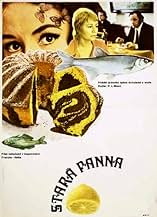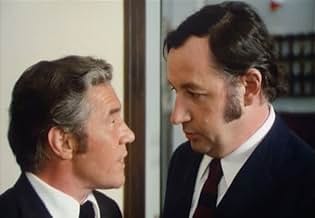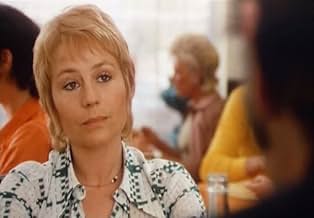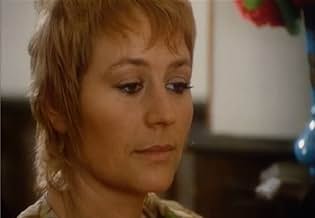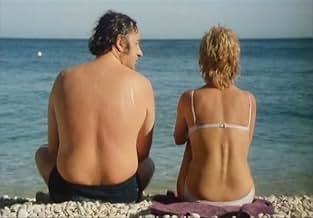IMDb-BEWERTUNG
6,8/10
637
IHRE BEWERTUNG
Füge eine Handlung in deiner Sprache hinzuA shy thirty year old woman and an aging bachelor find a way to each other, after initial complications.A shy thirty year old woman and an aging bachelor find a way to each other, after initial complications.A shy thirty year old woman and an aging bachelor find a way to each other, after initial complications.
- Regie
- Drehbuch
- Hauptbesetzung
- Auszeichnungen
- 4 Gewinne & 3 Nominierungen insgesamt
Albert Simono
- Daniel
- (as Simono)
Michael Lonsdale
- Monod
- (as Michel Lonsdale)
Empfohlene Bewertungen
A man and a woman meet in the same hotel in the south of France, while spending their respective holidays alone.
The movie was released in 1972, when an unmarried woman of 30 was still called "spinster" and people, either men or women, were mocked for their being single, in two different ways.
Several moments of inappropriate humor follow each other: "Do you want a room in order to sleep or to make love?" asks the receptionist, and suddenly shows a false embarrassment, hiding some mockery, when he sees that the man who has just asked for a room is alone.
The woman is constantly shown on her own on the beach, making clumsy moves inside a big poncho to change out of her wet swimsuit, while around her, groups of people chat, flirt, and enjoy happily.
In this movie (and the French should be known for being open-minded and avant-garde...) single people are sort of "aliens", lonely, goofy and pitiful and, when a man and a woman of that kind meet, it seems they are required to "combine their loneliness", no matter if they might not like each other completely.
The same mocking humor invests the minor characters, no more than caricatures (the nymphomaniac chambermaid, the Anglican priest always talking of death, his wife who fasts and has stigmata drawn on her hands and feet...). Nothing happens, except for some stupid dialogues and some small awkward incidents, the background of the two characters is not revealed and a possible relationship between the two is just a (future) possibility.
And what does the ending mean, with the two young girls, the same who talk nonsense in the first scene, now missing their train?
If the original title is disrespectful, the Italian one, "La tardona", is highly offensive.
Jean Pierre Blanc is not a very famous name for most viewers who have seen French films.However,after watching "La Vieille Fille"/The Old Maid it is hoped that audiences interested in serious cinema would be tempted to discover not only Jean Piere Blanc and his films but also many other unknown directors who have made meaningful,entertaining films.The theme of lonely people depicted in "The Old Maid" remains relevant even for contemporary audiences.However,the major difference is that the films about lonely people of the past relied more on imagination whereas the same films set in present times tend to be based on gimmicks and hype.By giving roles to Annie Girardot and Philippe Noiret,two of French cinema's most talented as well as known faces,a tender look at male/female relationships has been cast.Although the film is about some secondary characters with weak qualities,there is absolutely no hint of any mocking tone.Lastly,some sensitive observations about various facets of life especially in the context of human relations and love have been honestly presented in this film.This is a film to be watched if one is patient enough to let human sentiments rule over human reason.
Annie Girardot was THE French actress of the seventies .An outspoken nice personality ,she's cast against type as an old maid.But she's so good a thespian that she pulls it off with gusto,abetted by an excellent Philippe Noiret ,himself cast as a bachelor.Both are having a vacation at the seaside in a hotel .The man tries to make friend with her but it's a hard task because Mademoiselle Bouchon (=Miss Cork!!!)is an inhibited prudish woman .The dialog between them is intentionally down-to earth,dealing with "Oh What a lovely pebble!" "These are souvenirs for my family" .Only once they broach sexuality and not for a long time.Noiret and Girardot were such a wonderful couple that Philippe De Broca used them again in two of his late seventies movies .
But there 's a big flaw:the supporting characters are caricatures ,and although they are played by talented actors (Michel Lonsdale,Edith Scob,Marthe Keller) ,they really get in the way.That's why "la vieille fille" is only a good movie whereas it could have been a truly great one.
But there 's a big flaw:the supporting characters are caricatures ,and although they are played by talented actors (Michel Lonsdale,Edith Scob,Marthe Keller) ,they really get in the way.That's why "la vieille fille" is only a good movie whereas it could have been a truly great one.
Likeable main characters played by amazing actors of the time, easy to follow and digest story and pleasant location are forming quality package for this amazingly low-profile French comedy from the seventies. Noire and Girardot are actually aged only one year apart and forming a beautiful leading couple, while supporting characters are also surprisingly interesting, although not very deep.
I discovered this French drama back in the late seventies, on TV. I was still a kid but already loved it for its sensitivity, so fragile touch to describe human relations, and in a so realistic, accurate way. Both Philippe Noiret and Annie Girardot are absolutely stunning, terrific here, moving. I can't imagine anyone to remain cold in front of such a story. It is never lame, cheesy, dumb.... It reminds me a bit MADEMOISELLE CHAMBON , back in 2009, starring Vincent Lindon and Sandrine Kiberlain. Not the same story, not the same plot, but same character symphony and powerful way of showing it. Only an excellent film director could do it.
Wusstest du schon
Top-Auswahl
Melde dich zum Bewerten an und greife auf die Watchlist für personalisierte Empfehlungen zu.
Details
- Laufzeit1 Stunde 25 Minuten
- Sound-Mix
- Seitenverhältnis
- 1.66 : 1
Zu dieser Seite beitragen
Bearbeitung vorschlagen oder fehlenden Inhalt hinzufügen

Oberste Lücke
By what name was Das späte Mädchen (1972) officially released in India in English?
Antwort
